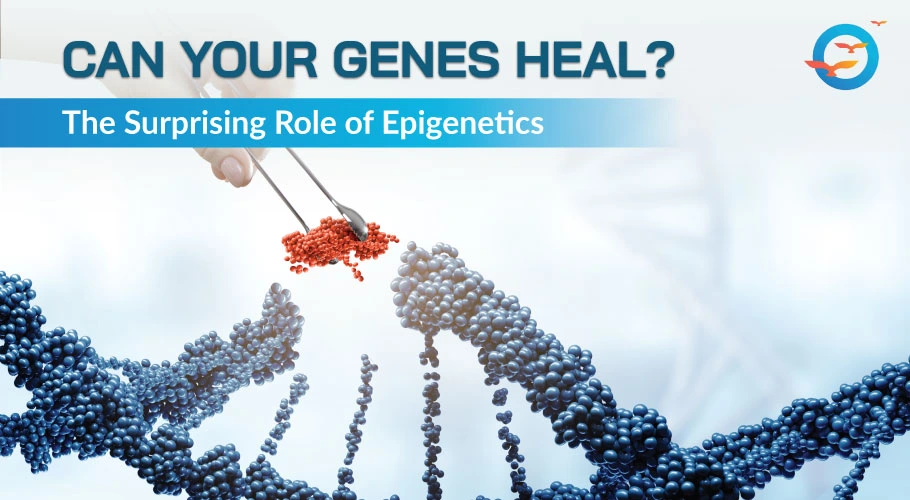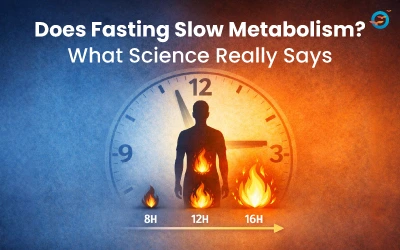Can Your Genes Heal? The Surprising Role of Epigenetics

You’re not stuck with the genes you inherit. New science around epigenetics and health shows that your daily habits, what you eat, how you sleep, how you manage stress can “switch on” protective genes and “switch off” disease-promoting ones. In other words, your choices can influence how your DNA behaves without changing the DNA itself.
This blog explains what epigenetics is, why it matters for conditions like diabetes, obesity and hypertension, and how you can use food and lifestyle to guide your gene expression in a healthier direction.
What Is Epigenetics and How It Affects Health?
Think of your DNA as a piano. Epigenetics is like the pianist who decides which keys to play. The sheet music (your genes) doesn’t change, but the performance (your health) does. Chemical tags added to DNA through a process called methylation epigenetics can turn genes on or off.
Unlike fixed genetics, epigenetics vs genetics means you have more control. Environmental factors such as toxins, poor diet, and chronic stress can add “bad” tags, while positive habits can add “good” ones that protect you from disease.
How Lifestyle and Diet Influence Your Gene Expression
Research including work popularised by Bruce Lipton epigenetics highlights how lifestyle choices shape gene expression. A diet rich in whole plants, exercise, quality sleep, and stress reduction all help your body’s self-healing process.
Nutrients like folate, B12 and choline supply methyl groups that support healthy DNA methylation. That’s why eating dark leafy greens, beans and seeds, the best plant based protein whole foods is powerful for healing the body naturally. A diverse, whole food plant based eating pattern also feeds gut microbes that influence epigenetic switches linked to immunity and metabolism.
The Link Between Obesity and Epigenetic Changes?
There’s growing evidence connecting obesity and epigenetics. Excess weight and inflammation can alter DNA methylation patterns, raising the risk of insulin resistance and heart disease. But positive changes can reverse harmful marks.
For example, studies show that prolonged fasting, intermittent or extended, supervised by a professional can reset metabolic pathways and improve insulin sensitivity. This is a vivid example of how epigenetics and lifestyle interact: fasting or calorie-controlled diets can influence genes that regulate fat storage, blood pressure and cholesterol.
Tips to Support Healthy Epigenetics
- Eat a variety of colourful plants, including the best plant based protein whole foods like lentils, tofu, seeds and nuts.
- Include methyl donors: folate or methylated folate from greens, beets, and legumes supports healthy methylation.
- Manage stress with meditation or yoga. Yes, research suggests meditation can influence epigenetic expression.
- Sleep 7–8 hours; disrupted sleep affects circadian epigenetics and metabolic health.
- Reduce toxins: limit ultra-processed foods, pesticides and plastics that may add harmful tags.
These small actions help you “heal your body naturally” at the cellular level.
Conclusion
Your genes are not your destiny. By understanding epigenetics and health, you gain power to influence how your DNA behaves. Through diet, movement, stress management and smart supplementation, you can guide your biology toward vitality instead of disease. The science of epigenetics shows you’re not just a passenger – you’re at the wheel.
Are you interested to know more about Prolonged Fasting: The Metabolic Reset for Diabetes, Obesity & Hypertension? Visit our blog.
FAQs
1. What is epigenetics and how does it affect my health?
It’s the study of chemical changes that turn genes on or off without altering DNA, meaning lifestyle can shape your health outcomes.
2. How does stress management impact epigenetic expression?
Lower stress reduces harmful methylation patterns, supporting better metabolic and immune function.
3. Can meditation change epigenetics?
Yes. Mindfulness and yoga are linked to beneficial gene expression patterns tied to inflammation and aging.
4. What is DNA methylation and its role in obesity?
It’s the main epigenetic mechanism. Unhealthy methylation can promote fat storage, while balanced methylation supports normal metabolism.
5. How does prolonged fasting affect epigenetics?
Studies show fasting can reset metabolic genes, improving insulin sensitivity and cellular repair.
6. What are the best plant-based foods for epigenetic health?
Leafy greens, legumes, nuts, seeds, berries – rich in folate, antioxidants and plant proteins.
7. How do genetics and epigenetics differ?
Genetics is the DNA code; epigenetics is how that code is expressed based on environment and lifestyle.
8. What factors affect epigenetic changes?
Diet, stress, sleep, exercise, toxins, and even social environment.
9. Can epigenetics influence cholesterol and metabolic disorders?
Yes. Healthy epigenetic patterns can improve lipid profiles, insulin sensitivity and blood pressure.

